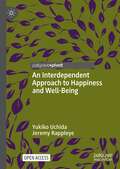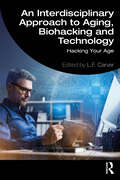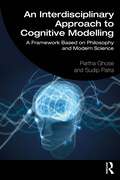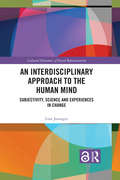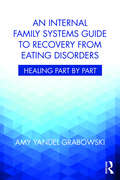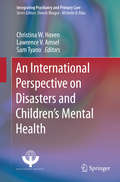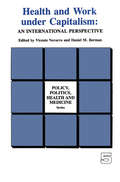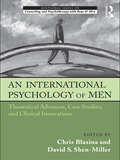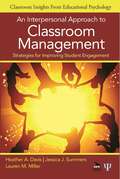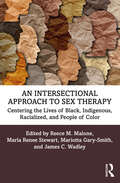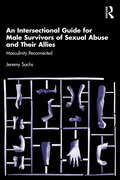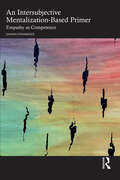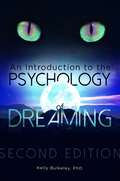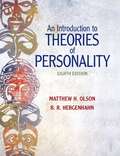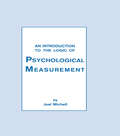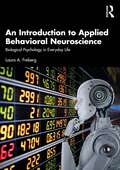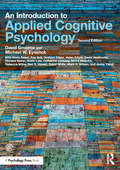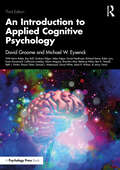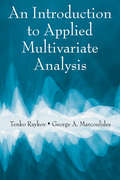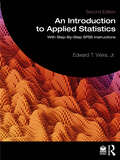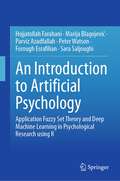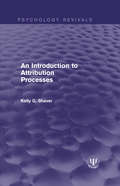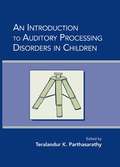- Table View
- List View
An Interdependent Approach to Happiness and Well-Being
by Jeremy Rappleye Yukiko UchidaThis open access book examines an interdependent approach to happiness and well-being, one that contrasts starkly with dominant approaches that have originated from Western culture(s). It highlights the diversity of potential pathways towards happiness and well-being globally, and answers calls - voiced in the UN’s Sustainable Development Goals - for more socially and environmentally sustainable models.Leading global organizations including the OECD, UNICEF, and UNESCO are now proposing human happiness and well-being as a more sustainable alternative to a myopic focus on GDP growth. Yet, the definition of well-being offered by these organizations derives largely from the philosophies, social sciences, and institutional patterns of Europe and the United States. Across seven chapters this book carefully probes the inadequacy of these approaches to well-being globally and reveals the distorting effect this has on how we imagine our world, organize institutions, and plan our collective future(s). It shares a wealth of evidence and examples from across East Asia - a region where interdependence remains foregrounded - and concludes by provocatively arguing that interdependence may provide a more sustainable approach to happiness and well-being in the 21st century. A timely and accessible book, it offers fresh insights for scholars and policymakers working in the areas of psychology, health, sociology, education, international development, public policy, and philosophy.This is an open access book.
An Interdisciplinary Approach to Aging, Biohacking and Technology: Hacking Your Age
by L. F. CarverAn Interdisciplinary Approach to Aging, Biohacking and Technology focuses on a broad range of issues that cover everything from the most basic ways technology and biohacking influence people’s everyday lives to concerns about equity, globalization and how we humans produce, consume and are consumed by our technologies.This edited collection looks at the intersection between technology and aging, addressing the ways in which technology affects individuals, groups, local communities and entire populations. Contributions from a range of disciplines including sociology, philosophy, communications, medicine and religion provide interdisciplinary perspectives, addressing questions such as ‘What is the impact of technology on adult bodies, our well-being and our safety?’ The book explores risks such as surveillance technology, body modification and the Internet as well as issues in the aging journey such as the body and its modification; communication, privacy and surveillance; gerontechnology and aging in place. Critically examining the journey of ageing and exploring techniques such as biohacking, this book is for students studying aging and technology, including courses such as psychology, sociology, philosophy, cultural studies, health studies and gerontology. It will also be of interest to scholars who are curious about an interdisciplinary approach to age and technology.
An Interdisciplinary Approach to Cognitive Modelling: A Framework Based on Philosophy and Modern Science
by Partha Ghose Sudip PatraAn Interdisciplinary Approach to Cognitive Modelling presents a new approach to cognition that challenges long-held views. It systematically develops a broad-based framework to model cognition, which is mathematically equivalent to the emerging ‘quantum-like modelling’ of the human mind. The book argues that a satisfactory physical and philosophical basis of such an approach is missing, a particular issue being the application of quantization to the mind for which there is no empirical evidence as yet. In response to this issue, the book adopts a COM (classical optical modelling) approach, broad-based but mathematically equivalent to quantum-like modelling while avoiding its problematic features. It presents a philosophically informed and empirically motivated mathematical model of cognition, mainly concerning decision-making processes. It also deals with applications to different areas of the social sciences. It will be of interest to scholars and research students interested in the mathematical modelling of cognition and decision-making, and also interdisciplinary researchers interested in broader issues of cognition.
An Interdisciplinary Approach to the Human Mind: Subjectivity, Science and Experiences in Change (Cultural Dynamics of Social Representation)
by Line JorangerOne of the main aims of modern mental health care is to understand a person's explicit and implicit ways of thinking and acting. So, it may seem like the ultimate paradox that mental health care services are currently overflowing with brain concepts belonging to the external, visible brain-world and that neuroscientists are poised to become new experts on human conduct. An Interdisciplinary Approach to the Human Mind shows that to create care that is truly innovative, mental health care workers must not only ask questions about how their conceptions of human beings and psychological phenomena came into being, but should also see themselves as co-creators of the mystery they seek to solve. Looking at the human being as a being with a biological body and unique subjective experiences, living in a reciprocal relationship with its sociocultural and historical environment, the book will provide examples and theories that show the necessity of an innovating, interdisciplinary mental health care service that manages to adapt its theory and methods to environmental, biological, and subjective changes. To this end, the book will provide an innovating psychology that offers a broad kaleidoscope of perspectives about the relations between the history of psychology, as a scientific discipline oriented to interpret and explain subject and subjectivity phenomenon, and the social construction of subjectified experience. This unique and timely book should be of great interest to critical and cultural psychologists and theorists; clinical psychologists, therapists, and psychiatrists; sociologists of culture and science; anthropologists; philosophers; historians; and scholars working with social and health theories. It should also be essential reading for lawyers, advocates, and defenders of human rights. The Open Access version of this book, available at https://www.taylorfrancis.com/books/9781315309682 has been made available under a Creative Commons Attribution-Non Commercial-No Derivatives 4.0 licence.
An Internal Family Systems Guide to Recovery from Eating Disorders: Healing Part by Part
by Amy Yandel GrabowskiDrawing on the evidence-based Internal Family System (IFS) therapy model, An Internal Family Systems Guide to Recovery from Eating Disorders: Healing Part by Part addresses the necessity of healing the eating disorder sufferer’s three groups of inner "Parts": the Mentors, the Advocates, and the Kids. In order to reconnect to their sense of Self and to achieve an inner balance necessary for recovery, the reader learns to address the unique needs of each of their "Parts." Written in an accessible style, this book combines compassionate examples from the author’s client cases and her own recovery with a step-by-step framework for identifying and healing the readers’ Parts using the IFS model. Each chapter ends with questions for the reader to answer to further enhance their personal recovery. An Internal Family Systems Guide to Recovery from Eating Disorders:Healing Part by Part will be essential to mental health professionals treating clients with eating disorders and to the clients themselves.
An International Perspective on Disasters and Children's Mental Health: An International Perspective (Integrating Psychiatry and Primary Care)
by Christina W. Hoven Lawrence V. Amsel Sam TyanoThis book provides a broad international perspective on the psychological trauma faced by children and adolescents exposed to major disasters, and on the local public health response to their needs. An outstanding quality of the book is that it draws upon the experience of local researchers, clinicians, and public mental health practitioners who dedicated themselves to these children in the wake of overwhelming events. The chapters address exemplary responses to a wide variety of trauma types, including severe weather, war, industrial catastrophes, earthquakes, and terrorism. Because disasters do not recognize geographic, economic, or political boundaries, the chapters have been selected to reflect the diverse global community’s attempt to respond to vulnerable children in the most challenging times. The book, thus, examines a diverse range of healthcare systems, cultural settings, mental health infrastructure, government policies, and the economic factors that have played an important role in responses to traumatic events. The ultimate goal of this book is to stimulate future international collaborations and interventions that will promote children’s mental health in the face of disaster.
An International Perspective: An International Perspective (Policy, Politics, Health and Medicine Series)
by Vicente Navarro Daniel M. BermanWhile the health effects of many aspects of life, from diet to marital status, have been extensively explored, little study has been made of the health effects of work. Covering such topics as on-the-job dangers, the role of unions in worker protection, and occupational health in both developed and developing countries, this collection of articles conclusively demonstrates the negative impact that neglect of citizens' working lives has on pubic health. With more Americans dying each year from job-related causes than were killed in a decade of combat in Vietnam, "Health and Work Under Capitalism" is a long-overdue and unusually significant book.
An International Psychology of Men: Theoretical Advances, Case Studies, and Clinical Innovations (The Routledge Series on Counseling and Psychotherapy with Boys and Men)
by Chris Blazina David S. Shen-MillerThis text is the first to provide a contextual understanding of the clinical issues that affect men and masculinity across a wide range of cultural and national settings. It demonstrates that gender can no longer be viewed as an isolated characteristic; in an era of increased globalization, mental health professionals need to take ethnic and cultural issues into account to provide adequate care for male patients. Numerous international perspectives are offered by the contributing authors, authorities from countries such as Australia, Argentina, Denmark, Canada, India, Ireland, and South Africa, on theoretical and clinical innovations for working with men. Their chapters also offer insight into the socio-cultural contexts for counseling men in and from their respective countries by exploring the ways in which "being a man" is socially defined, what unique challenges men face, and how these challenges can be negotiated within their specific cultural settings. Topics addressed will include boyhood notions of manhood, relationship concerns and power, fatherhood, and men’s body image across the life span. This text will ultimately enable mental health practitioners to have a better understanding of how to work more effectively with male clients.
An Interpersonal Approach to Classroom Management: Strategies for Improving Student Engagement
by Heather A. Davis Jessica J. Summers Lauren M. MillerThe authors engage you from the start by contrasting how differently teachers respond to common situations. They expertly bridge the gap between educational psychology and classroom management from the perspectives of student engagement, peer and student-teacher relationships, and teacher self regulation. Both current and prospective teachers will find helpful tools for engaging difficult students, managing challenging relationships, and handling conflict. Key topics include: <p><p> Student behavioral, relational, and cognitive engagement in the learning process <p> Classroom structures that contribute to student engagement <p> The contribution of peer relationships to positive and negative behavior management <p> Strategies that help children learn to manage their own behavior <p> Connecting with students who are culturally and linguistically diverse
An Intersectional Approach to Sex Therapy: Centering the Lives of Indigenous, Racialized, and People of Color
by James C. Wadley Reece M. Malone Marla Renee Stewart Mariotta Gary-SmithWhen a Black, Indigenous, or racialized individual or relationship works with a sex therapist, a host of cultural circumstances can contribute to intimacy discord and sexual dysfunction. This collection brings together clinicians and educators who share their approaches, bridging sex therapy with a client’s relationship to their racial, cultural, and ethnic identity. This essential book aims to enhance therapists’ supervisory practices and clinical treatments when working with culturally diverse and marginalized populations, fostering greater understanding and awareness. Innovative tools that integrate the impacts of acculturation, minority status, intersectionality, and minority stress are discussed, with case studies, demonstrations, and critical questions included. This collection is a necessary read for anyone who is training to be or who is an established sex therapist, marriage and family therapist, relationship counselor, or sexuality educator and consultant.
An Intersectional Guide for Male Survivors of Sexual Abuse and Their Allies: Masculinity Reconnected
by Jeremy SachsFew experiences carry more shame, stigma, and misunderstanding than the life-altering trauma of sexual abuse. Men who experience sexual abuse and rape, often find themselves marginalised and isolated, yet there are few resources available for them or those who support them.This book examines the impact of sexual abuse on different men through an intersectional lens, exploring how their unique identities, circumstances, and society's views affect their recovery or compound their trauma. Each chapter addresses a topic chosen by hundreds of male survivors who have attended the author’s recovery groups. It includes survivor testimonies, signposts to resources, and reflective activities to help manage the aftermath of sexual trauma. With statutory services, such as the criminal justice system, often failing male survivors, the book draws on Transformative Justice principles to suggest alternative ways for men to break cycles of trauma and move forward with their lives.Aimed at male survivors and those who support them—counsellors, psychotherapists, social workers, family members, and loved ones—this book offers guidance and hope for navigating a path to healing.
An Intersubjective Mentalization-Based Primer: Empathy as Competence
by Johann SteinbergerThis book explores how Affect Resonance Training (ART), as developed by the Viennese psychotherapist Johann Steinberger, offers students and trainees in psychosocial professions the opportunity to develop competence in empathy, allowing them to better understand themselves and others.Based on concepts of empathy, resonance and mentalization, this innovative mode of teaching offers effective tools and training for empathetic understanding. This book presents clear instructions for its application in the classroom, summarizing several years of intensive institutional practice. The book also outlines the program’s rich theoretical background and documents its empirical effectiveness.With clear instruction on the use of ART and clinical insights on how increased empathy is effective in therapeutic settings, this book is essential reading for psychoanalysts, psychotherapists, and others across the psychosocial professions.
An Introduction To The Psychology Of Dreaming, 2nd Edition
by Kelly BulkeleyWhy do people dream, and what do dreams mean? What do the most recent neuroscientific research and studies of patterns in dream content reveal about the functionality of dreams? How do the ideas of earlier generations of dream psychologists continue to influence the research of psychologists today? An Introduction to the Psychology of Dreaming covers all major theories in dream psychology from 1900 to the present day. It provides readers with a unique resource that focuses specifically on this lineage of research in dream psychology and is concise and accessibly written. Each chapter of the book analyzes a particular theory of dream psychology in terms of three basic questions: How are dreams formed? What functions do dreams serve? How can dreams be interpreted? By examining each theorist's answers to these questions, readers can clearly see how dream psychology theorists have both incorporated concepts from previous researchers and developed new ideas of their own. A breadth of psychological approaches is considered, from Freud and Jung to contemporary brain studies, giving readers an appreciation of the wide range of theories regarding this fascinating area of study.
An Introduction To Theories Of Personality
by B. R. Hergenhahn Matthew H. OlsonAn Introduction to Theories of Personality, , 8/e -- is just the standalone book For Sophomore/Junior level courses in Theories of Personality, Personality, or Personality Psychology. Using a theorist-by-theorist approach, this comprehensive introduction to personality theory gives students the history of psychology with practical information to help them understand their own lives and their relationships with others. Primary sources, abundant biographical information and supporting research are used to descibe and detail each theorist, presenting the theories of personality in an accessible and unbiased way.
An Introduction To the Logic of Psychological Measurement
by Joel MichellThis book declines to take for granted the widespread assumption that existing psychometric procedures provide scientific measurement. The currently fashionable concepts of measurement within psychology -- operationalism and representationalism -- are critically examined, and the classical view, that measurement is the assessment of quantity, is defended. Within this framework, it is shown how conjoint measurement can be used to test the hypothesis that variables are quantitative. This theme is developed in detail using familiar psychological examples, such as Thurstone's law of comparative judgment, multidimensional scaling, and Coombs' theory of unfolding.
An Introduction to Applied Behavioral Neuroscience: Biological Psychology in Everyday Life
by Laura A. FrebergAn Introduction to Applied Behavioral Neuroscience explores the connection between neuroscience and multiple domains, including psychological disorders, forensics, education, consumer behavior, economics, leadership, health, and robotics and artificial intelligence. The book ensures students have a solid foundation in the history of behavioral neuroscience; its applicability to other facets of science and policy, and a good understanding of major methodologies and their limitations to aiding critical thinking skills. Written in a student-friendly style, it provides a highly accessible introduction to the major structural and functional features of the human nervous system. It then discusses applications across a variety of areas in society, including how behavioral neuroscience is used by the legal system, in educational practice, advertising, economics, leadership, the development of and recovery from health challenges, and in robotics. Each of the application-specific chapters present the problems that neuroscience is being asked to address, the methods being used, and the challenges and successes experienced by scholars and practitioners in each domain. It is a must-read for all advanced undergraduate and postgraduate students in biological psychology, neuroscience, and clinical psychology who want to know what neuroscience can really do to address real-world problems.
An Introduction to Applied Behavioral Neuroscience: Biological Psychology in Everyday Life
by Laura A. FrebergAn Introduction to Applied Behavioral Neuroscience explores the connection between neuroscience and multiple domains, including psychological disorders, forensics, education, consumer behavior, economics, leadership, health, and robotics and artificial intelligence. The book ensures students have a solid foundation in the history of behavioral neuroscience; its applicability to other facets of science and policy, and a good understanding of major methodologies and their limitations to aiding critical thinking skills. Written in a student-friendly style, it provides a highly accessible introduction to the major structural and functional features of the human nervous system. It then discusses applications across a variety of areas in society, including how behavioral neuroscience is used by the legal system, in educational practice, advertising, economics, leadership, the development of and recovery from health challenges, and in robotics. Each of the application-specific chapters present the problems that neuroscience is being asked to address, the methods being used, and the challenges and successes experienced by scholars and practitioners in each domain. It is a must-read for all advanced undergraduate and postgraduate students in biological psychology, neuroscience, and clinical psychology who want to know what neuroscience can really do to address real-world problems.
An Introduction to Applied Cognitive Psychology
by David Groome Michael EysenckAn Introduction to Applied Cognitive Psychology offers an accessible review of recent research in the application of cognitive methods, theories, and models. Using real-world scenarios and engaging everyday examples this book offers clear explanations of how the findings of cognitive psychologists have been put to use. The book explores all of the major areas of cognitive psychology, including attention, perception, memory, thinking and decision making, as well as some of the factors that affect cognitive processes, such as drugs and biological cycles. Now in full colour, and with a companion website, this new edition has been thoroughly updated to include cutting-edge research and theories. There are also new chapters on perceptual errors and accidents, the influence of emotion, and the role of cognitive factors in music and sport. Written by well-respected experts in the field, this textbook will appeal to all undergraduate students of cognitive psychology, as well as professionals working in the areas covered in the book, such as education, police work, sport, and music.
An Introduction to Applied Cognitive Psychology
by David Groome Michael EysenckThis bestselling textbook offers an accessible introduction to the application of cognitive psychology, looking at how the findings of cognitive psychologists have been put to use in real life.Using real-world scenarios and engaging everyday examples, the book offers clear explanations of how cognitive psychology can be applied in the real world, as well as the different methods, theories and models of research employed. It explores all of the major areas of cognitive psychology, including attention, perception, memory, thinking and decision making, as well as some of the factors that affect cognitive processes, such as drugs and biological cycles. The third edition has been thoroughly updated to include new material on working memory training and prospective cognition.Written by well-respected experts in the field, this textbook will appeal to all undergraduate students of cognitive psychology, as well as students of applied and forensic psychology.
An Introduction to Applied Multivariate Analysis
by George A. Marcoulides Tenko RaykovThis comprehensive text introduces readers to the most commonly used multivariate techniques at an introductory, non-technical level. By focusing on the fundamentals, readers are better prepared for more advanced applied pursuits, particularly on topics that are most critical to the behavioral, social, and educational sciences. Analogies betwe
An Introduction to Applied Statistics: With Step-By-Step SPSS Instructions
by Edward T. Vieira, Jr.An Introduction to Applied Statistics offers a comprehensive and accessible foundation in applied statistics, empowering students with the essential concepts and practical skills necessary for data-driven decision-making in today's world. Thoroughly covering key topics – including data management, probability fundamentals, data screening, descriptive statistics, and a broad spectrum of inferential analysis techniques – this indispensable guide demystifies statistical concepts and equips students to confidently apply statistical analysis in real-world contexts.With a systematic, beginner-friendly approach, the author assumes no prior knowledge, making complex statistical foundations accessible to students from a variety of disciplines. Concise, digestible chapters build statistical competencies within a practical, evidence-based framework, minimizing technical jargon to facilitate comprehension. Now in its latest edition, the book is fully updated with SPSS v29.0 instructions and screenshots, ensuring compatibility with the most recent software developments. It also includes expanded content on addressing nonrandom sampling issues, such as case weighting, and delves into advanced topics like factor analysis, logistic regression, cluster analysis, and discriminant analysis, catering to the evolving needs of students and professionals alike.An invaluable resource for introductory quantitative research methods courses in psychology, social sciences, business, and marketing, this text combines practical examples, online resources, and an approachable format to support both learning and application.Key Features: Concise chapters integrating real-world applications: Seamlessly blends statistical skills with practical scenarios, illustrating the flexible use of statistics in evidence-based decision-making. Accessible presentation: Offers practical explanations of statistical procedures with minimal technical jargon, enhancing understanding and retention. Foundational preparation: Early chapters are designed to equip students for advanced statistical procedures, building a strong foundational knowledge. Step-by-step SPSS instructions: Provides detailed SPSS v29.0 guidance with screenshots to reinforce comprehension and hands-on skills. Real-world exercises with answers: Includes practical exercises complete with solutions to facilitate active learning and application. Comprehensive instructor resources: Offers extensive teaching support with chapter PowerPoints and test banks to enhance the educational experience.
An Introduction to Art Therapy Research
by Lynn KapitanAn Introduction to Art Therapy Research is a pragmatic text that introduces readers to the basics of research design in quantitative and qualitative methodology written in the language of art therapy, with particular attention to the fields unique aspects, current thinking, and exemplars from published art therapy research studies. This combination of a broad, standard approach to research design plus art therapies particular perspective and major contributions to the subject make the text suitable for courses in introductory research, survey of art therapy history and literature, art therapy assessment, and ethics. The book includes strategies for evaluating research reports and writing for peer-reviewed publication, features that make the text of special value to students, practitioners, doctoral candidates, and academics writing for publication. An online instructor's manual with student resources is available and offers material to enhance the pedagogical features of the text.
An Introduction to Artificial Psychology: Application Fuzzy Set Theory and Deep Machine Learning in Psychological Research using R
by Peter Watson Sara Saljoughi Hojjatollah Farahani Marija Blagojević Parviz Azadfallah Forough EsrafilianArtificial Psychology (AP) is a highly multidisciplinary field of study in psychology. AP tries to solve problems which occur when psychologists do research and need a robust analysis method. Conventional statistical approaches have deep rooted limitations. These approaches are excellent on paper but often fail to model the real world. Mind researchers have been trying to overcome this by simplifying the models being studied. This stance has not received much practical attention recently. Promoting and improving artificial intelligence helps mind researchers to find a holistic model of mental models. This development achieves this goal by using multiple perspectives and multiple data sets together with interactive, and realistic models. In this book, the methodology of approximate inference in psychological research from a theoretical and practical perspective has been considered. Quantitative variable-oriented methodology and qualitative case-oriented methods are both used to explain the set-oriented methodology and this book combines the precision of quantitative methods with information from qualitative methods. This is a book that many researchers can use to expand and deepen their psychological research and is a book which can be useful to postgraduate students. The reader does not need an in-depth knowledge of mathematics or statistics because statistical and mathematical intuitions are key here and they will be learned through practice. What is important is to understand and use the new application of the methods for finding new, dynamic and realistic interpretations. This book incorporates theoretical fuzzy inference and deep machine learning algorithms in practice. This is the kind of book that we wished we had had when we were students. This book covers at least some of the most important issues in mind research including uncertainty, fuzziness, continuity, complexity and high dimensionality which are inherent to mind data. These are elements of artificial psychology. This book implements models using R software.
An Introduction to Attribution Processes (Psychology Revivals)
by Kelly G. ShaverWhy do people act the way they do? How do their desires and fears become known to us? When are our opinions of others correct, and when are they likely to be mistaken? These are questions which attribution theory tries to answer. Originally published in 1975, this title provides an informal introduction to the field of attribution, with the theoretical principles and issues illustrated in everyday examples. The origins of current attribution theory are outlined, and models of the inference process are examined. The intellectual debt owed to social psychology by the attribution theory is acknowledged, and an exploration of the interpersonal and social consequences of attribution is included.
An Introduction to Auditory Processing Disorders in Children
by Teralandur K. ParthasarathyAuditory processing in children (APD) comprises an increasingly important clinical area within the broad field of communication disorders. This new textbook presents the major advances in the assessment and management of APD. The chapter authors, highly regarded clinicians and researchers from diverse professional groups, contribute an impressive breadth of knowledge to explain and demystify APD. This text will be useful to students of speech language pathology and audiology, as well as professionals in those fields.
